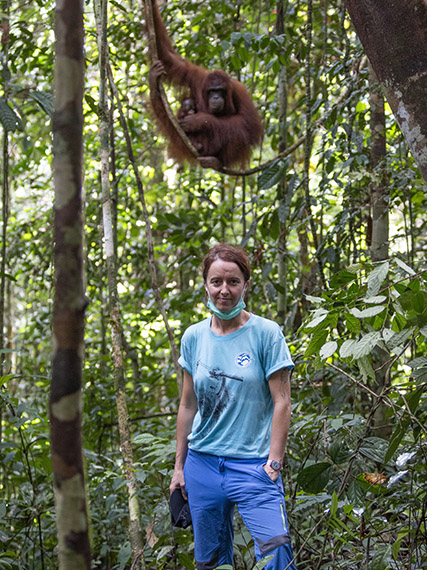CONTRIBUTION
“In order to rescue animals, you first have to rescue humans.” This is how Karmele Llano (Bilbao, 1978) describes the conservation strategy deployed by International Animal Rescue (IAR) in Indonesia, the organization she founded in 2006 to protect the biodiversity of the island of Borneo, with particular attention to one of its emblematic, and critically endangered species: the orangutan. “It’s a region with widespread poverty,” says Llano, “where indigenous communities have no access to either healthcare or education, and this pressure drives them to practices like poaching and illegal felling.” In awareness of this, the IAR, according to the jury granting it the Worldwide Biodiversity Conservation Award, has led a project privileging the “empowerment of local people” as a means to halt the degradation of the ecosystem harboring Borneo’s orangutan population, “beset by deforestation due to the advance of palm oil cultivation.”
Between 1999 and 2015, over 100,000 of Borneo’s orangutans were lost as a consequence of habitat loss and fragmentation, poaching, and wildlife trafficking. Without action to stem the decline, it is reckoned that by 2025, 82% of the population will be extinct. The goal of IAR Indonesia is to prevent the disappearance of these great apes and other unique species that inhabit Borneo, among them the proboscis monkey and the clouded leopard, through a conservation program in the Bukit Baka Bukit Raya National Park, occupying 200,000 hectares of tropical rainforest of immense conservation value. “This zone is known as the heart of Borneo,” Llano points out. “It is an area supremely rich in biodiversity, with many plants and animals found nowhere else. If they go extinct here, they disappear from the face of our planet.”
After graduating in veterinary medicine from the University of León, Llano, who admits to a lifelong love of “all animals, but especially wildlife,” took the decision in 2003 to move to Indonesia to take part in a volunteer scheme for the rescue and recovery of orangutans. “It was planned to be just a short trip,” she recalls, “but it changed my whole life, as I chose to devote myself completely to the program.” Three years later, she and her husband Argitoe Ranting – an Indonesian also involved in the protection of these primates – founded a local NGO which in 2007 concluded a collaboration agreement with International Animal Rescue, an international organization engaged in conservation work with threatened species in six countries. Today, the IAR Indonesia Foundation that Llano leads has 250 people working in biodiversity conservation in Borneo.
“Our project uses a holistic approach,” its director explains. “Initially we confined ourselves to the rescue and reintroduction of orangutans displaced by habitat loss and fragmentation, but we later realized that these efforts would come to nothing if we didn’t lend support to local communities, who were still resorting to illegal logging because they had no other way to make a living.”
Since its creation, IAR has restored to the forest 46 rescued orangutans that have successfully readapted to life in the wild. But furthermore, the organization that Llano heads has launched a support program focused on the healthcare, education and employment of local indigenous communities as a way to halt deterioration of the ecosystem that sustains the great apes. “In rich countries,” she explains, “we suffer a disconnect that blinds us to the reality of these communities. They, by contrast, lack even the bare essentials and the conservation of nature is a luxury, because they face hardship on a daily basis and their first priority is to preserve themselves.” Thanks to her organization’s efforts, some 70 local people once engaged in illegal logging now work for IAR in the rescue and recovery of orangutans.
“These animals never cease to amaze me,” says Llano. The Spanish vet and her team have been privileged to observe orangutan mothers teaching their young in what she calls “the forest school”: proof that these primates have a culture, in the sense that knowledge is transmitted from generation to generation. “The infants learn by imitation what can or cannot be eaten, their mothers or other adults teach them about the dangers of the forest, such as reptiles, and they are even instructed on how to make a bed out of branches and leaves.” For all these reasons, says Llano, “not respecting orangutans is almost like not respecting our own species, because of how close they are to us.”
MORE
i
